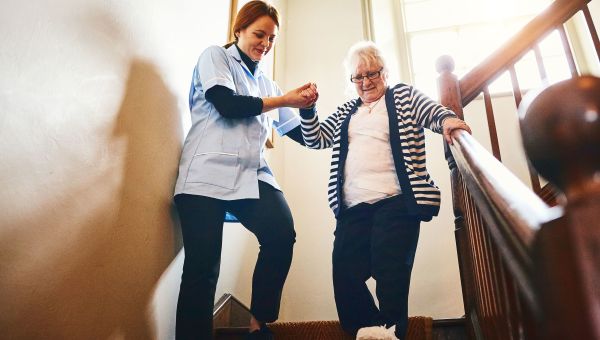7 things a neurosurgeon wants you to know about Parkinson's treatment
You can't cure PD, but you can get a handle on its symptoms.

If you’re one of the approximately 60,000 people in America diagnosed with Parkinson’s disease (PD) annually, it can seem overwhelming at first. Parkinson’s is a neurological condition that is both chronic and progressive, and learning to live with the symptoms is a challenge. But the symptoms of PD are manageable, and there are many different options patients can discuss with their doctors.
Timing is key when considering what treatment to pursue. “The important factors are what stage of the disease the patient is presenting—if it’s early in the disease or later in the disease or in intermediate terms,” says Hazem Abdalla Eltahawy, MD, who specializes in neurological surgery at St. Mary Mercy Livonia hospital in Michigan. Here, he discusses the different types of treatments for Parkinson’s, including medication, surgery and dietary changes, as well as ways in which patients can seek support.

Pay Attention to Symptoms
Parkinson’s is a degenerative disorder of the nervous system that primarily affects dopamine-producing neurons in the brain. When the number of these neurons decline, dopamine levels drop, leading to Parkinson’s.
Signs of Parkinson’s can develop slowly over the years and vary from patient to patient; they include tremors, slowed movement, and later on, problems with balance. Early-onset symptoms can also include an inability to move your arms when walking, slow or low speech and limited facial expression.
“Often times, early in the disease, the symptoms are very mild, and sometimes just supportive measures are started,” Eltahawy says. Once Parkinson's is diagnosed, then medical treatment can be started. "The mainstay of treatment is dopamine replacement, essentially.”
One of the most common medicinal treatments for Parkinson’s is a combination of levodopa and carbidopa, but no two people with Parkinson’s are alike, and treatment plans are customized for each individual patient.

Watch What You Eat
After medication is prescribed, patients must help ensure its effectiveness. While there is no specific diet for people with Parkinson’s, certain patients can make nutritional choices that will help with the absorption of the medicine.
Eltahawy advises patients to keep in mind that foods very high in protein can sometimes reduce absorption, and that patients should avoid eating a large meal at the same time they take their prescription. Parkinson’s patients are also encouraged to avoid citrus drinks rich in acid, like orange juice, because they can increase acid reflux when combined with medicine. This is especially true if PD is affecting your ability to move food between your stomach and your intestines.
Living with Parkinson’s doesn’t require people to exclude specific foods, he adds. If you find yourself losing weight or experience a sudden drop in the effectiveness of your medication, look at your protein intake—and consider nutritional counseling.

Get Moving
Exercise is an important part of maintaining quality of life when living with Parkinson’s. Studies have shown that physical activity can improve mobility, balance and gait, as well as disease symptoms. The Parkinson's Foundation suggests trying weight training, tai-chi and tango dancing, all of which have been found to be beneficial.
“Maintaining an active lifestyle is very useful,” Eltahawy says, adding that walking and swimming are also beneficial forms of exercise for those diagnosed with Parkinson’s.

Remember: Surgery is an Option, But Not the Only One
Surgery can be used as a form of treatment for Parkinson’s disease, but it is only considered for patients with disabling symptoms for whom medicine and therapy have not been effective.
“That field of surgical intervention has advanced quite nicely,” Eltahawy said, adding that the most prominent type of intervention is a low-risk procedure called deep-brain stimulation, performed by a neurosurgeon.
The surgery, which Eltahawy said often requires just local anesthesia, is performed by inserting a small pacemaker wire into the brain. This helps stop motor fluctuations and essentially balances out the electric currents in the brain from the loss of the dopamine. As a result, the patient’s need for medication may decline, tremors become less disruptive and quality of life can improve significantly.

Keep Your Mental Health in Mind
While motor skills and function may be the most noticeable physical symptoms of Parkinson's disease, mental health issues like anxiety and depression are also common, especially as basic functions like walking and talking become increasingly difficult.
"The more manifested features are the motor features," says Eltahawy, "but often times the features that are not manifested are the ones that could be really disabling.”
Patients looking for support can begin by asking their treating physician or neurologist for recommendations for groups or therapists; referrals from family, friends, community mental health centers and local or state psychological associations may be helpful, as well. Online, organizations like the Parkinson’s Foundation and the Michael J. Foundation for Parkinson’s Research can provide resources and important information. Remember: determining if a therapist is a good fit can take some time, and there are different factors to consider before committing to working with one.
Need help locating a therapist? Try the Find a Doctor function on Sharecare for iOS or Android for specialists in your community.

Seek Programs Specific to Helping Those With Parkinson's
Along with emotional encouragement, some organizations can assist with developing skills and abilities that Parkinson’s might make difficult.
“Patients could benefit from joining a program specifically designed for Parkinson’s disease, essentially to address the balance issues, walking issues, dexterity, hand function, hand grip strength—all of those can be very useful as the disease progresses,” Eltahawy says. SPEAK OUT!, for example, is a therapeutic program designed to help those with the condition strengthen their speech muscles and use their voices.
Similar to finding support for mental health issues, people living with Parkinson’s can find these programs by asking their doctors, surgeons and hospitals. Reaching out to other patients for suggestions and referrals, whether in-person or through online communities, can also help.
More On


video

article

slideshow


video


video
